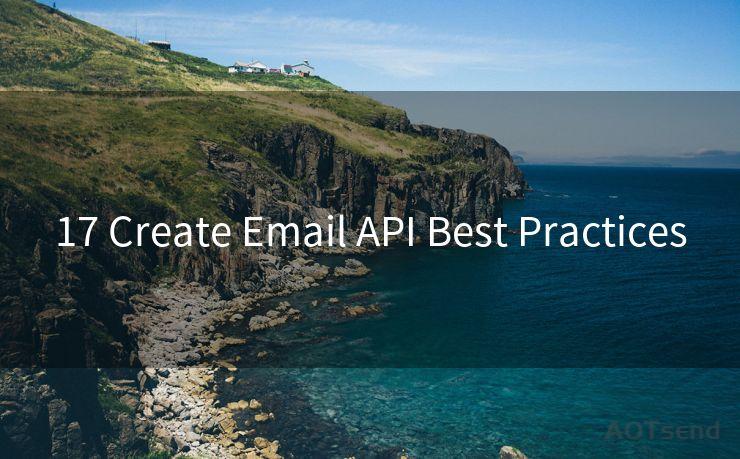17 Create Email API Best Practices




When it comes to creating an Email API, there are several best practices to ensure efficiency, security, and user satisfaction. Here are 17 essential tips to guide you through the process:
1. Clear Documentation
Provide comprehensive documentation for your API. Detail each endpoint, its parameters, expected responses, and error codes. Clear documentation lowers the learning curve for developers and reduces integration errors.
2. RESTful Design

Adopting a RESTful design for your Email API makes it more intuitive and easier to use. Stick to HTTP methods like GET, POST, PUT, and DELETE for different actions.
3. Authentication and Authorization
Implement robust authentication and authorization mechanisms. OAuth 2.0 or API keys are common methods to secure API access.
4. Input Validation
Always validate incoming data to prevent injection attacks and ensure data integrity. Use white-listing and regular expressions to sanitize inputs.
5. Rate Limiting
Introduce rate limiting to prevent API abuse. Set reasonable limits on the number of requests per minute/hour to protect your servers from overload.
6. Error Handling
Design a clear and consistent error handling mechanism. Use HTTP status codes and descriptive error messages to help developers understand and resolve issues quickly.
🔔🔔🔔
【AOTsend Email API】:AOTsend is a Managed Email Service for sending transactional emails. Support Email Types: reminders, authentication, confirmations, notifications, verification codes, invoices, password resets, account activations, billing statements, two-factor authentication (2FA), and one-time passwords (OTP) emails, etc. $0.28 per 1000 Emails. 99% Delivery, 98% Inbox Rate.
You might be interested in:
Why did we start the AOTsend project, Brand Story?
What is a Managed Email API, How it Works?
Best 25+ Email Marketing Platforms (Authority,Keywords&Traffic Comparison)
Best 24+ Email Marketing Service (Price, Pros&Cons Comparison)
Email APIs vs SMTP: How they Works, Any Difference?
7. Pagination and Filtering
For APIs that return lists of data, implement pagination to limit the amount of data returned in a single request. Provide filtering options to allow users to narrow down results.
8. Versioning
Plan for API versioning from the start. As your API evolves, versioning ensures backwards compatibility and gives users time to adapt to changes.
9. Monitoring and Logging
Set up robust monitoring and logging to track API usage, performance, and errors. This helps identify and resolve issues quickly.
10. Caching
Implement caching mechanisms to improve performance and reduce server load. Caching frequently accessed data can significantly enhance API response times.
11. Testing
Ensure your API undergoes rigorous testing, including unit tests, integration tests, and performance tests. Automated testing frameworks can help maintain quality as the API evolves.
12. Scalability
Design your API with scalability in mind. Consider using load balancers, distributed caching, and horizontal scaling to handle increased traffic.
13. Security
Protect your API from common web vulnerabilities like SQL injection, cross-site scripting (XSS), and cross-site request forgery (CSRF). Regularly update dependencies and apply security patches.
14. Feedback Loop
Encourage users to provide feedback. Implement a mechanism to collect and respond to user suggestions and bug reports.
15. Clear Upgrade Path
As your API evolves, provide a clear upgrade path for existing users. Document breaking changes and provide migration guides.
16. Compatibility with Standards
Ensure your API follows industry standards and best practices, such as RESTful principles and JSON formatting. This enhances interoperability and reduces integration complexity.
17. Ongoing Support and Maintenance
Commit to ongoing support and maintenance. Regularly update your API to fix bugs, add features, and improve performance.
By following these 17 best practices, you can create a robust, secure, and scalable Email API that meets the needs of your users and stands the test of time. Remember, an API is not just a technical tool but also a service that requires constant care and attention.




Scan the QR code to access on your mobile device.
Copyright notice: This article is published by AotSend. Reproduction requires attribution.
Article Link:https://www.mailwot.com/p5656.html



